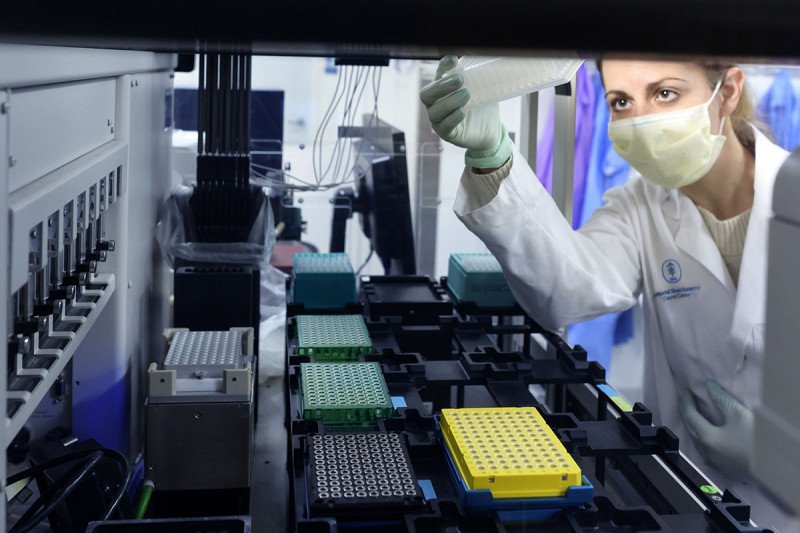
A technologist in the MSK-IMPACT lab
Fifty years ago, the signing of the National Cancer Act launched the nation’s “War on Cancer” and ushered in a new era of cancer research and care. The legislation inspired a national commitment to making progress against cancer, the second leading cause of death in the U.S.
In recognition of this anniversary and National Cancer Research Month, MSK reflects on its legacy of groundbreaking research with a round-up of some notable cancer research milestones from the past 50 years.
As one of the three original comprehensive cancer centers in the U.S., MSK has a deep history of cancer research that has continually advanced the field and provided new and powerful ways for the institution – and the wider cancer community – to diagnose and treat cancer. Driving the effort is one of the world’s most dynamic programs of cancer research, with more than 100 research laboratories focused on better understanding the many types of cancer and the biology underlying them. In addition, MSK is home to more than 30 state-of-the-art core facilities, which provide its research community with the latest research technology and a wide range of expert services.
The past 50 years have seen MSK researchers collaborate with the oncology community to repeatedly push the field forward and build on previous advances:
- Detecting colorectal cancer: In 1994, MSK researchers led a study which found that removing colon polyps can reduce the risk of colorectal cancer. In 2018, in response to a troubling emerging trend, MSK opened the first center dedicated to researching, detecting, and treating colorectal and gastrointestinal cancers in people under age 50.
- Breast cancer – less is more: In 1997, MSK surgeons demonstrated the value of sentinel lymph node biopsy, which spares some women from having underarm lymph nodes removed and the corresponding side effects. In 2018, MSK participated in the TAILORx clinical trial, which found that postmenopausal women with low-to-intermediate-risk breast cancer may not need chemotherapy as part of their treatment regimen.
- CAR T cell therapy – a living drug: In 2002, MSK researchers built the first effective chimeric antigen receptor (CAR) T cells, a type of personalized immunotherapy. In 2017, the FDA approved the first of several CAR T cell therapies now available to treat certain types of blood cancers.
- Addressing the psychiatric needs of patients with cancer: In 1977, MSK became the first cancer center to establish a psychiatry service dedicated to the clinical care of, teaching about, and research into the psychological aspects of cancer and unique challenges faced by patients, providing a model for the nation. In 2020, this service adapted to ensure patients could continue to receive mental health care remotely during the COVID-19 pandemic.
- Advancing targeted therapy: In the 1990s while at the University of California, Los Angeles, MSK physician-scientist Charles Sawyers played a pivotal role in the development of imatinib (Gleevec®), one of the first successful targeted drugs for cancer. MSK researchers helped contribute to the approval of imatinib for gastrointestinal stromal tumors in 2002. In 2017, MSK established an Early Drug Development Service, which has led research contributing to the FDA approval of several next generation targeted therapies for the treatment of various cancers, including larotrectinib in 2018, entrectinib in 2019, and selpercatinib in 2020.
- Genetic sequencing – a new study paradigm: In 2014, MSK scientists used a powerful genetic test they designed called MSK-IMPACT™ to sequence a patient’s tumor for the first time. MSK-IMPACT data was published in a landmark 2015 New England Journal of Medicine study that introduced the concept of basket trials and laid the groundwork for tissue-agnostic drug indications. Just a few years later in 2017, MSK-IMPACT became the first academic or commercial tumor-profiling test authorized by the US Food and Drug Administration.
Additional MSK research milestones include:
- 1973: MSK performed the United States’ first successful bone marrow transplant between an individual and a patient who had no biological relationship to the donor.
- 1976: MSK scientists developed a method for detecting tumor-specific antigens in some types of cancer – essential information for developing specific tumor vaccines.
- 2011: The FDA approved ipilimumab (Yervoy®), the first immune checkpoint inhibitor, based on the work of MSK investigators in both the lab and clinic.
A Dedicated Focus on Research
MSK researchers collaborate internally and externally to bring together laboratory investigators and clinicians from different disciplines to advance the current understanding of tumor biology and explore new ways to cure, control, and prevent disease.
The Sloan Kettering Institute (SKI) is MSK’s research arm dedicated to understanding the biology of cancer through nine major research programs. SKI investigators collaborate with MSK physician-scientists to help speed important research findings from the laboratory to the patient.
MSK also conducts one of the largest clinical research programs in the world, with hundreds of clinical trials open to patients, both pediatric and adult. Some of these clinical trials look at new therapies that may be able to help treat or potentially cure the disease. Others study therapies to see whether they produce fewer side effects than what’s currently used to treat the disease. Still others may focus on improving quality of life for people who have already had cancer treatment or are living with cancer.